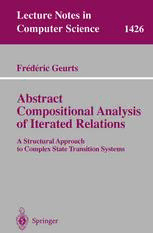
Abstract Compositional Analysis of Iterated Relations: A Structural Approach to Complex State Transition Systems PDF
282 Pages·1998·2.181 MB·English
Most books are stored in the elastic cloud where traffic is expensive. For this reason, we have a limit on daily download.
Preview Abstract Compositional Analysis of Iterated Relations: A Structural Approach to Complex State Transition Systems
Description:
This self-contained monograph is an integrated study of generic systems defined by iterated relations using the two paradigms of abstraction and composition. This accommodates the complexity of some state-transition systems and improves understanding of complex or chaotic phenomena emerging in some dynamical systems. The main insights and results of this work concern a structural form of complexity obtained by composition of simple interacting systems representing opposed attracting behaviors. This complexity is expressed in the evolution of composed systems (their dynamics) and in the relations between their initial and final states (the computation they realize). The theoretical results are validated by analyzing dynamical and computational properties of low-dimensional prototypes of chaotic systems, high-dimensional spatiotemporally complex systems, and formal systems.
See more
The list of books you might like
Most books are stored in the elastic cloud where traffic is expensive. For this reason, we have a limit on daily download.
